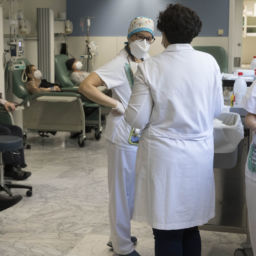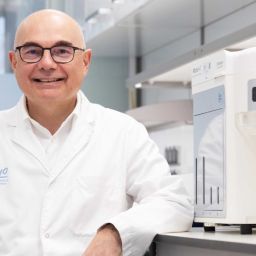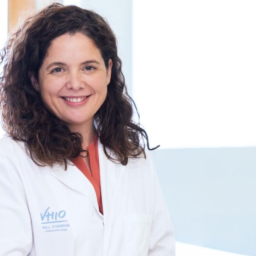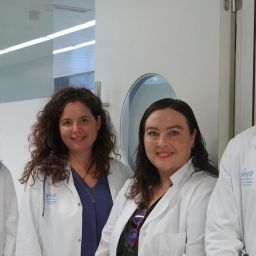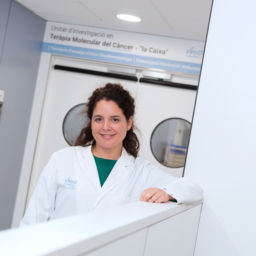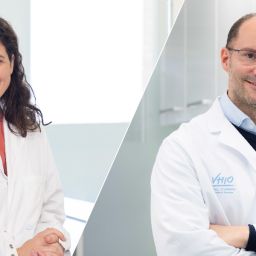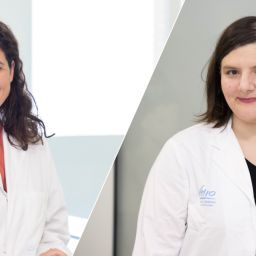
The journal Nature has published the results of a clinical trial led by researchers from the Clínica Universidad de Navarra Cancer Center and the German company Catalym. The trial also involved the VHIO Cancer Molecular Therapy Research Unit (UITM-CaixaResearch), led by Dr Elena Garralda. The findings have the potential to transform cancer treatment through immunotherapy.
A study led by the Clínica Universidad de Navarra Cancer Center and the German company Catalym has clinically proven that neutralising the GDF-15 protein enhances immunotherapy treatment for cancer, at least in a subset of patients whose tumours had become resistant to conventional treatments.
GDF-15 is a substance mainly produced by the tumour that acts as a repellent to immune system cells, preventing their infiltration into cancerous tissue. This protein, which is most likely used by the placenta to prevent the rejection of antigens inherited from the father, is also used by tumours to resist immune system attacks.
The results, published in Nature, show that when GDF-15 is blocked, immune system cells that can recognize and destroy tumours get past this barrier and attack the tumour efficiently, leading to tumour shrinkage or even complete disappearance. According to Dr Ignacio Melero, co-director of Immunology and Immunotherapy at Cima and Clínica Universidad de Navarra, “GDF-15 becomes a very important pharmacological target in the treatment of oncological diseases. We are looking at results that could potentially transform the way cancer is treated, although further studies with a larger number of patients are needed to confirm the scope of this new combined treatment.”
The phase I-II clinical trial was also conducted in hospitals in Madrid and Barcelona, with the participation of VHIO UITM-CaixaResearch, one of the centres that recruited the highest number of patients, and START Madrid CIOCC. The treatment was tested on approximately 200 patients with solid tumours who had shown resistance to anti-PD-(L)1 antibody treatment.
“Despite the revolutionary results of blocking PD-(L)1, most patients do not respond to the treatment or respond temporarily, with resistance appearing. In this trial, participants received escalating doses of the monoclonal antibody visugromab (developed by Catalym, which neutralises GDF-15) in combination with nivolumab (which neutralises PD-1), and tumour biopsies were taken at different times to analyse changes in immune system cell behaviour during the treatment,” explains Dr Elena Garralda, an oncologist at Vall d’Hebron University Hospital, director of VHIO UITM-CaixaResearch and co-author of the study published in Nature.
The study showed that the combination of the two drugs induces antitumour responses with excellent tolerability. Additionally, laboratory analyses clearly highlight the mechanism of action. “We observed objective reductions in tumour burden that were deep and durable in a fraction of the treated patients, as well as some complete responses with the disappearance of all measurable tumour lesions in patients who had not responded previously to multiple treatments,” states Dr Melero.
Breakthrough in cachexia treatment
Cancer-induced cachexia, characterised by severe weight and muscle loss, is a common and debilitating condition in patients with advanced cancer. The protein GDF-15 plays a central role in this process by acting on the central nervous system, reducing appetite and increasing energy expenditure.
“Inhibiting this protein yields clinically significant results, as it also helps patients regain weight,” explains Dr Ignacio Melero. This potential benefit was recently proven in a clinical trial published in the New England Journal of Medicine, which highlighted the efficacy of a monoclonal antibody in combating tumour-induced cachexia.
Dr Melero adds, “In our clinical trial, we observed that patients with elevated serum levels of GDF-15 gained weight after treatment with visugromab. This suggests that the medication could provide nutritional benefits for cancer patients, although our study did not include individuals specifically diagnosed with cachexia.”
On 12 December, Dr Elena Garralda presented these findings at an educational session during the European Society for Medical Oncology Immuno-Oncology Congress (ESMO IO), held in Geneva from 11 to 13 December.



